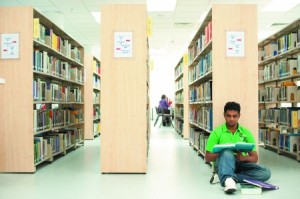February 3, 2014, by michaelgroves
The Essentiality of Reading
CELE Tutor Yan Lai Peen reflects on the value, importance and enjoyment of extensive reading
The mention of books and reading evokes one of these emotions – excitement, dread, or nonchalance – depending on who we are and how we grew up. As I grew up in a house where the television set was dominated by older family members, I read to pass time. Gradually, it became a ‘hobby’. This is how many people might perceive reading – a hobby, sometimes associated with nerdiness – and perhaps even a luxury. However, in academia, reading is not merely a hobby; it is a necessity if one is to thrive. While reading academic texts will stand one in good stead, that little extra seasoning to make our experience more flavourful lies in reading beyond academic texts. Reading extensively fosters critical thinking and mutual understanding in a multicultural community, and helps one adapt to one’s environment – all of which are core requirements in university life.
In the previous post, Yao Hing, my colleague, expounded on the importance of critical thinking in today’s society. Critical thinking skills, while best taught explicitly, can also be developed over time through exposure to different viewpoints and cultures. One way to achieve this is through reading; it opens up one’s mind and shapes one’s thoughts. The more diverse our reading materials and the more actively we engage with them, the more capable we will be of discerning the value of what we read. As Shakespeare says in Hamlet, “There is nothing either good or bad but thinking makes it so.”
Thriving in a multicultural learning environment also entails being able to appreciate and understand the existence of differing worldviews. Recently, I came across a news article about a writer, Ann Morgan, who resolved to read a book from every country in the world within a year. It is quite a feat but one can imagine the wealth of knowledge, cultures, and perspectives she must have learnt by the end of the year. We may not have the luxury of time to read 196 books but a modest goal of even 20 would be feasible. UNMC students have the benefit of being in a community that fosters culturally-diverse friendships and understanding. Reading with an open mind would enrich these connections even more. I remember discussing a book by a Nigerian author, Buchi Emecheta, with a student from Nigeria who audited my class for a day. Many months later, we met again and he remembered the lively discussion we had had. The knowledge we gain and perspectives we develop through reading can deepen our connections with others and render our associations with them more meaningful.
As one gradually begins to see things from different perspectives and cultures, one learns to adapt to one’s environment. Academia is inherently a culture in itself in which students have to survive and learn the ropes. It requires us to develop life skills such as independent learning and thinking, and time management. A broad mind developed through reading can help one understand the challenges brought about by a new environment and help ease one into it.
Reading – as mentioned earlier – is an acquired taste to some. For many, it takes a considerable amount of effort to tune out of everything else and focus single-mindedly on the book at hand. But overcome this initial hurdle and a treasure trove will be waiting to be discovered. A university is where creative and critical thinking is fostered, where leaders and thinkers are groomed. In this regard, none puts it as succinctly as Harry S. Truman – “Not all readers are leaders, but all leaders are readers.”
-
Post a comment

